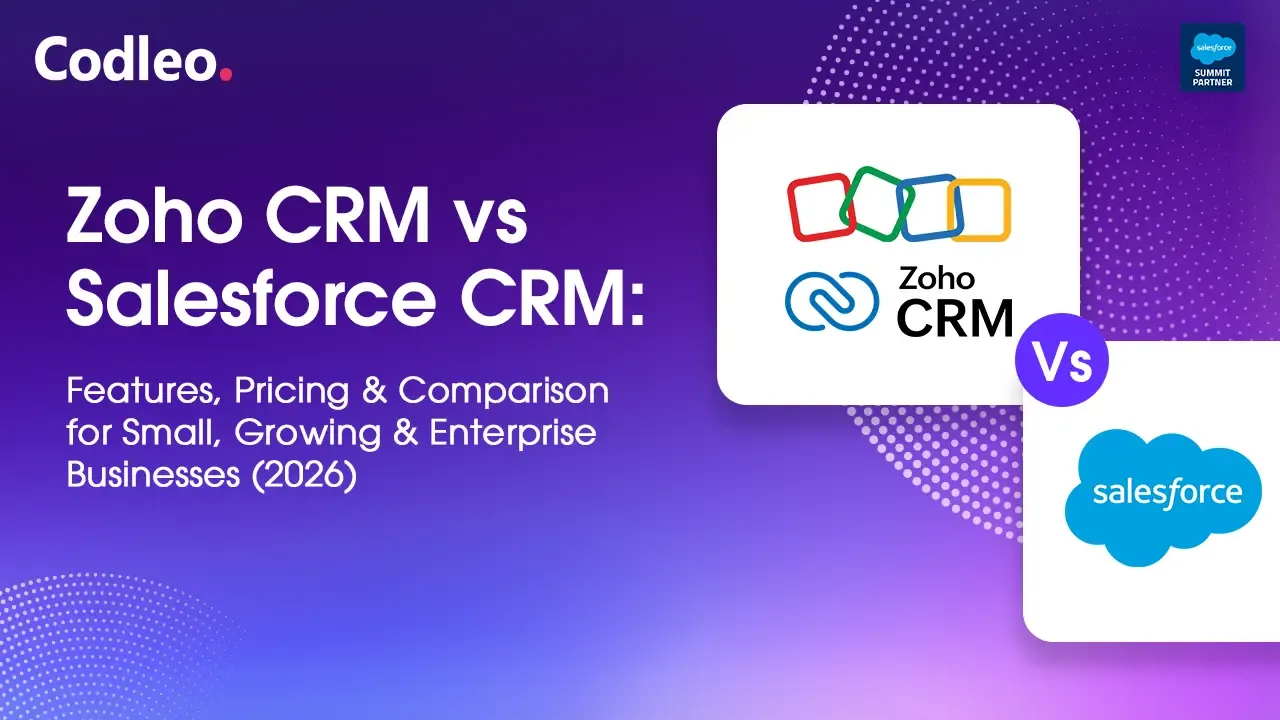Publish date:
Salesforce Inc. is a leading CRM company and is the number one choice among businesses. Many companies prefer to use Salesforce's complete set of tools because they are easy to customize and require little coding skills. Since its founding in 1999 by Marc Benioff, the company has continued to grow. Salesforce has expanded its offerings for various industries, including Sales Cloud, Nonprofit Cloud, and Health Cloud.
Salesforce Inc. has about 150,000 partner companies worldwide, including ours. These partners are licensed to sell Salesforce licenses and customize its various tools for businesses. Partners are ranked in a hierarchy: Base, Ridge, and the highest level, Summit. We are proud to be a Summit tier partner, a significant achievement. A large team of Salesforce specialists in different areas helps maintain the partners' reputation. One crucial role is that of Salesforce consultants within partner firms. Today's blog will discuss this career profile and its importance to employers and clients of the best Salesforce partners.
Why do Salesforce partner companies value Salesforce Consultant Certifications?
-
Stamp of knowledge: A diploma, certificate, or degree shows you have gained essential skills and knowledge. It proves to employers that your skills have value and that you meet the requirements to be a good professional.
-
More efficiency: A Certified Salesforce Consultant works smart and efficiently completes the job. Using best practices is standard for Salesforce partners. Clients can trust these certified professionals to handle their work confidently, knowing that Salesforce recognizes them.
-
Catalysts for business growth and turnaround: These professionals help struggling or declining companies. Their knowledge and advice can lead to positive changes. Because of their skills and certifications, businesses want to work with them. A Salesforce partner highlights that having these experts makes the business brighter.
-
Good source of revenue: Certified consultants are extremely valuable. Many companies, especially in growing markets like India, are increasingly choosing Salesforce. Because of this high demand, certified consultants can charge a premium rate. This is good news for their employers, the Salesforce partners, who can bill clients accordingly.
Are Salesforce Certifications Still Relevant? Top Voices Join the Great Cert Debate
Salesforce certifications are a great way to enhance your skills and show you have the knowledge needed for a specific job.
Many new admins, developers, and architects hope to land great jobs after certification. However, the value of these certifications has become a controversial topic. Some people even warn that the wrong approach to certifications might signal problems to employers.
Why So Many Certifications?
Most entry-level and experienced jobs require applicants to have the Salesforce Administrator certification. It makes it a common starting point for many people.
Getting your admin certification should be a top priority if you want to start a career in Salesforce. This is similar to how a person aiming to become a professional driver should immediately focus on getting their driving license.
To begin your journey, the answer to “Where do I start?” is straightforward: get the admin certification, which is the most common starting point. After that, the options become less clear. There are currently about 50 certifications available for members of the ecosystem.
These roles can be easily grouped by type, with specific qualifications for associates, admins, designers, and others. However, with so many certifications now available, has this made them less valuable?
Many jobs require specific certifications, but does having more certifications help? If you’re new to the field or trying to switch roles, is it worth spending time on Trailhead when you lack experience in the area you want to pursue?
We talked to people in the ecosystem to hear their views on whether Salesforce certifications are fading away and how many certifications are too many.
Luke Freeland: “You ask simple questions, and they can’t even respond.”
Salesforce Technical Architect and Consultant Luke Freeland explained that the administrator certification is the starting point. It shows you understand the basics of the platform. After that, you can choose your focus area.
He told Salesforce Ben, “I focus more on development and the technical side of becoming an architect. I've been eligible for CTA for years, and I think having it would be nice, but it’s unnecessary. I believe I have the skills without needing Salesforce’s official approval.”
Luke said the exam costs $6,000, which seems unworthy of the price. However, having the admin certification is helpful. He also believes consultant certifications are valuable because they challenge you with different problems and scenarios, not just technology.
“You need to use your knowledge to choose the right option,” Luke said. “You must have both knowledge and experience to know which option to select, and it isn’t always a simple choice. I value the consultant, sales cloud, and service cloud certifications more than others.”
Luke has 15 certifications. He thinks the associate certifications are too easy to get and not very valuable. As an independent consultant, he believes having certifications builds credibility with employers, clients, and customers. Because of this, he decided to earn "a bunch of them."
Luke believes that using certifications can motivate him to keep learning about Salesforce. He sees them as a “carrot” that encourages his education. However, he also shared his hiring manager experience interviewing many candidates, especially developers. He noticed that some candidates had certifications but lacked essential knowledge in their field.
Luke said, “I’ve met many people with certifications, and when you ask them basic questions, they can’t answer. I wonder, ‘How did you pass the test?’”
He mentioned that he highly values the Force.com advanced developer certification. Unlike a multiple-choice test, it is more similar to the current CTA exam.
"You first completed the multiple choice section of step one, then you had a programming assignment that you could work on for a month,” Luke said. “When you were ready to submit it, Salesforce cut off your access. After that, people at Salesforce reviewed your work and gave you a grade and feedback. If you passed, you then had to write an essay.”
He explained that after passing the exam, he respected those who had also passed it. This is because they had to demonstrate their programming skills.
"Certifications can be helpful. They show that you want to learn. However, for entry-level jobs, certifications alone are usually not enough. You must do more to stand out and compete in today’s job market."
Vicki Mortiz-Henry: “People are playing the Pokémon game and trying to collect them all.”
Vicki Moritz-Henry, who started as a Salesforce Administrator and is now an Architect and co-founder of Automation Dreamin’, believes that certifications are just one part of a bigger picture. She thinks different approaches work for other people.
She told Salesforce Ben, “I know people in the ecosystem who have been here for 20 years longer than I have. They have zero or one certification, and as a hiring manager, I would happily hire them based on their work experience.”
Vicki points out that some people have up to 40 certifications. This highlights a different approach to career development.
“It depends on whether people are playing the Pokémon game to collect all the characters, or if they are using it as part of their learning and career development,” she said.
As someone who hires administrators, she stated she would “never” choose someone based only on their certifications or ability to pass a multiple-choice exam. Instead, she would focus on the projects they have completed and what their portfolio shows. She values a desire to learn more than just relying on certifications.
When asked about the growing number of Salesforce certifications, which now total around 50, Vicki stated she does not think there will be “inflation” in certifications. She explained that Salesforce has released many products, and the certifications match those products.
“As Salesforce continues to offer many different products and expand its catalog, it's important to get the certifications that match those skills,” she said.
“You know and can pass an exam, but you also need hands-on experience to succeed.”
We asked Vicki about the growing role of AI, especially Agentforce, in Salesforce’s business strategy. We also wanted to know if working with AI could be a new starting point for careers, like roles in administration or development.
She said, “Some people enter this field without a background in development or administration. They may come from marketing. We see this trend with business analysts. You can also start in project management and business analysis without needing to know the technical details of the platform.”
AI can be a way to start a career, though it may not be as significant as paths like admin or development. There are many ways to enter the field that we don't always discuss.
When asked if certifications are losing value, she pointed out their importance depends on individual career goals. Getting certifications is very useful for some people, and aiming for five each year can be a good plan. For others, certifications may not be the right choice.
She said, “The most important thing is to do what fits your style and values and where you want to go. There are strong opinions about whether to get certifications, but if you think about it, the right answer may differ for each person.”
Peter Chittum: “It’s Never a True Gauge of Talent”
Peter Chittum, a Salesforce ecosystem influencer and Developer Relations Advisor at Westview 1, told Salesforce Ben that there are more critical factors than certifications, although they have some value.
He said, “Getting a certification could be helpful, especially if your employer pays for it. However, I’m unsure if having 10 certifications will help you get a job in a job shortage. Maybe one might help, but you should focus on building something instead!”
Peter was asked if the many available certifications have made them less valuable. He also considered whether certifications were seen as more critical in the past.
He replied, “I don’t expect all certifications to lose value. The value of a certification depends on the market demand for that skill and how many people know it. For example, how many Education Cloud projects exist? How many people have that certification?
“From our point of view, it’s hard to say. However, I don’t believe that more certifications will devalue them all, unless clients get confused about which certification matches the right project expertise.”
Peter believes that certifications aimed at developers are not very useful.
He thinks there are better ways to show a developer's skills than through a multiple-choice test.
Peter noted that he questions whether Salesforce makes much money from certifications. He believes the revenue they generate is small for a large company. While a certification may help someone get better job opportunities early in their career or learn a new skill, actual project experience will be more critical in the long run.
If you work for a Salesforce partner, having certifications is very important. Salesforce uses these certifications to determine partner levels. For example, you cannot become a platinum partner without the required certifications.
Peter says, “The Certified Technical Architect (CTA) is the only certification that provides real value to a person. However, unlike most other certifications, you need experience to achieve it. You cannot earn a CTA without having hands-on experience in implementation. This is why they created lower-level architect certifications to help people gain the skills needed for the CTA.”
Thinking like a hiring manager, Peter said he would look for 1-2 certifications for an entry-level position and match those certifications with the job experience related to the position he was hiring for.
He says, “As a developer and engineering manager, I look for open source code contributions in community forums and focus on the quality of what people share. There are many clues to what someone knows. If their public image doesn’t match their work, I might still interview them, but I would question that difference.”
Peter says, “Certification shows a basic level of knowledge. It doesn’t truly measure expertise or talent.”
Paul Battisson: “Certifications Will Never Be Killed Off”
Paul Battisson, Founder and CEO of Groundwork Apps, a Salesforce app delivery service, emphasizes that certifications are essential. However, he believes you should obtain them to show you already know, not as a way to learn.
Paul said, “Certifications are still valuable and will always be important. They confirm that a person has a basic level of knowledge.”
The human element that provides value to customers or users is the experience and understanding of using that knowledge correctly.
"Understand a requirement and create a clear and scalable solution that best uses the platform and products."
Salesforce certification guides suggest you have some prior experience before using them. It means they are meant to show your existing knowledge.
Paul says, “As job roles change, having certifications can prove your experience and knowledge. It helps set a standard for comparison and gives customers confidence.”
Jennifer Olson: “Having No Experience but 12 Certifications Looks Bad”
Salesforce Solution Architect Jennifer Olson holds 16 certifications, which she believes are essential for entering the industry.
Getting the administrator certification is a good first step in showing your knowledge. According to Jennifer, if you are still job hunting and have the time, pursuing base certifications like the platform app builder can also be helpful.
She told Salesforce Ben, “If you have no experience but 12 certifications, it doesn’t look good. I’ve spoken to hiring managers, and I know from experience. When I see people on LinkedIn with 20 certifications but no work experience in Salesforce, I think, ‘You’re just a good test taker.’ You need to be able to apply what you’ve learned.”
She said that people looking for jobs without experience should not just keep getting more certifications.
“Once you have three certifications, you should get some hands-on experience. If you don’t have that experience, work on personal projects and show them off,” she said.
“The hardest part is when you lack experience. When you work without a client case, you only think about what you know. Client cases can be very complex and may introduce ideas you haven’t considered, which helps you gain experience. However, in the meantime, you should work on personal projects beyond just your own needs.”
Before getting her first job, Jennifer met with a group of people who were also looking for work. They decided to create a project that reflected something realistic.
The idea they created was about two people getting married. Instead of asking guests to RSVP by mail, they wanted to use a QR code. When someone scans the code, the system automatically marks them as “attending,” assigns them a table, and completes other tasks.
The group decided not to work on one shared project. Instead, they chose to create their unique organizations. This way, each member could fully understand how their organization works, rather than just having limited knowledge from working as part of a team on one project.
Group members will meet once a week to discuss and solve problems together. Each person will learn how the organization works and will be able to answer questions about it in interviews.
Jennifer said, "It's essential because when you work on a group project..."
"You don’t need to know everything about Salesforce – it’s too large. Focus on the basics, which is what we did.
The group also began supporting each other on LinkedIn before Dreamforce 2022. They used Jennifer’s marketing skills to promote each other effectively."
"I believe gaining real experience is more valuable than collecting certifications. While there are opportunities to volunteer with organizations, these can sometimes lead to mistakes that affect their work."
If you have a mentor, especially someone from a nonprofit, and they check your work, you are in a good position. At a certain point, getting experience is more important than collecting certificates.
"I recommend getting two to three certifications and working on projects. It's important to promote yourself as well. Remember, it's not just about the certifications."
Jennifer mentioned that consultancies will encourage you to get certifications. You can follow that advice and become a “good test taker.” However, seeking opportunities to use those qualifications on projects is also essential. Doing so will help you gain practical knowledge.
She mentioned that a friend of hers is a hiring manager. He believes the number of certifications doesn’t matter as much as how you will use them. Jennifer said, “I think it’s a waste of time to get a certification you think you will use but don’t have any practical knowledge of.”
Andy Engin Utkan: “Employers Want Experience With CICD Pipelines… Not Just Certifications”
Andy Engin Utkan, the founder of Salesforce Break and Flow Canvas Academy, points out that too many certifications exist. He questions whether hiring managers understand all of them. He shared with Salesforce Ben that it's essential to consider how the job market changed during the pandemic when considering the value of certifications.
He said, “During the pandemic, the demand for consultants and admins was very high. Since almost everyone worked remotely, this created equal opportunities across the United States.”
Salaries for the same positions used to vary widely between states. Many employers began offering the same pay as their rivals to stay competitive.
Most hiring managers believe that experience is more important than certifications. Suppose you have relevant experience and can discuss your skills, which will impress them more than certifications. Having certifications in addition to your experience is a bonus.
In the end, due to high demand for workers, big consulting firms and some smaller ones were eager to hire inexperienced candidates. However, these candidates often lacked the necessary experience. As a result, the firms required them to obtain specific certifications and provided many training programs to help them gain the needed skills.
Andy says it's currently harder to find jobs in the United States due to layoffs and lower demand for consulting services.
People want to save money instead of spending it. In the past, they would spend leftover budgets at this time of year. Now, people are cutting back on spending. Some are leaving Salesforce or reducing their use of it. Currently, the focus is on saving money while using AI to work faster, be more efficient, and cut costs.
He stated that this impacts the certification world. In the past, employers often hired and trained people with admin certifications. Today, however, businesses are not as motivated to do that.
When you look at job boards, you will see many admin positions. Employers want candidates with skills in Apex and Visualforce. They also expect experience with CICD pipelines and other related tools, not just certifications.
According to Andy, having the right qualifications is still essential. He noted that in today's job market, where many applications flood in for each position, employers often look for candidates with advanced administrator or platform developer skills. This helps them narrow down the pool of applicants.
“Basic skills are critical, along with specializations. The person will need the field service certification if the job involves field service.”
Evan Ponter: “If you want a job as a Salesforce Administrator, you must have the certification.”
Salesforce Consultant Evan Ponter told Salesforce Ben that the value of certifications depends on each person's journey. He shared that he started as an "accidental admin" without certifications, but wanted more responsibilities with Salesforce at the small nonprofit where he worked.
When he discovered people could build a career with Salesforce, he earned his admin and Force.com developer certifications in 2014. Evan said:
At the beginning of my career, having certifications to get my first job was very important. Employers want to see that you have the Salesforce Administrator certification if you apply for that role.
"As I have advanced in my career since that job, I realize that no one has asked me if I have a certification."
I earn about one certification each year. I don’t aim to collect as many as possible, but when I feel confident in a Salesforce area, I use my hands-on experience to prepare. Then, I signed up for the exam, studied using the Trailhead guide, and took the test.
I have worked in the Salesforce field since 2014, so it's been 10 years. I now have 11 certifications. One of those certifications, the Certified Application Architect, was free because I completed all the prerequisites. I still stay updated and maintain my skills.
“Once you land your first job, employers will pay more attention to the projects you've completed, your experience, and how you tackle problems than your qualifications.”
When asked who he would hire in a situation where two equally qualified candidates are competing, one with 10 certifications and the other with none or just two, Evan said that the number of certifications would not be the main factor in his decision.
He said, “I’m looking for someone who fits in with our team and has a good personality. I want to see how you solve problems, how you think, and what the team needs.”
"There are other important factors to consider. I have never been a hiring manager, so I can’t speak from experience, but I would not let the number of certifications alone determine my choice."
“There are too many factors to consider: Did they just pass the exam? Do they have good experience? Do they remember what they learned? It’s too complicated to use that as a deciding factor.”
Joey Chan: “There are many things in my daily organization that I wouldn't handle if I didn’t have the certification.”
Joey Chan, a Salesforce Architect and founder of Cloud Jedi Solutions, told Salesforce Ben that getting certified today is easier because many good and bad blogs are available.
Yes, getting certified is still worth it. Certification can be advantageous, especially when starting as a junior employee. If two junior candidates have the same job and salary, the one with certifications will likely be chosen. Certifications can help you get your foot in the door.
When discussing whether experience is more important than other factors, he mentioned that there is still value in having experienced people without many certifications. However, getting qualifications is still essential. Joey said, “The value of certifications is that there are many things I wouldn’t handle in my daily work if I hadn’t prepared for this certification.”
I see the value in this. Even though some people have worked in admin roles for 3 to 5 years, they might not understand the details of setting up a new Salesforce instance. You only gain this experience when you set one up.
"You can’t just assume someone knows what they're doing because they've been doing it for many years. Certifications show a basic level of knowledge, but they don't guarantee expertise. I think certification is the minimum requirement to say someone is qualified."
He mentioned that he has a data cloud certificate but doesn’t feel confident enough to handle an entire project. Although he believes he could manage it, he doesn’t consider himself an expert just because he qualifies.
Joey said, “Collecting as many certifications as possible became a game. I have close to 36, so it no longer matters to me. I admire people who work hard to earn many certifications, as long as they don’t cheat. It still requires effort!”
“There are many things that can go wrong with a Salesforce implementation. You want to reduce those risks.”
He agreed that taking actions outside work to show you are willing to make things happen is much better than just saying you can do something. Joey believes that the value of certifications depends on what you hope to achieve with them.
“You won’t get the same salary as someone else just because you have 10 certifications. You also need a certain amount of experience,” he said.
"I still find certification valuable. I am studying for some things that I probably shouldn’t be."
Final Thoughts
After talking to several ecosystem members, a few main ideas about the certification issue came up.
Most people believe having more certifications is not a key factor in hiring decisions. Instead, employers prioritize relevant experience, cultural fit, and problem-solving skills. However, many agree that certification in a relevant field benefits Salesforce career starters.
Getting your first admin certification is a good step, especially because many employers look for this when hiring for entry-level jobs. Certifications have benefits, too. As Joey Chan points out, they encourage people to explore topics and issues they wouldn’t normally encounter, which helps to broaden their knowledge and experience.
Luke Freeland argues that this theory doesn't match reality. From his own experience, he has found that some people who are considered qualified do not understand the basics of their field.
It may be ambitious to summarize all the interesting points from my conversations for this article, but here’s the key takeaway: If you want your first job in the Salesforce ecosystem, focus on getting one or two certifications and gaining relevant experience. Don’t just keep collecting certifications without building something.
Certifications are still necessary, especially for newcomers. They help people enter their fields.
However, after gaining some experience, many find that certifications can provide value in certain areas but don't fully represent a person’s skills. Other factors become more critical to consider.
So, are certifications becoming irrelevant? They’re not gone yet, but having too many might be a disadvantage in some cases.
Also Read: STEPS TO BECOMING A SUCCESSFUL SALESFORCE CONSULTANT















